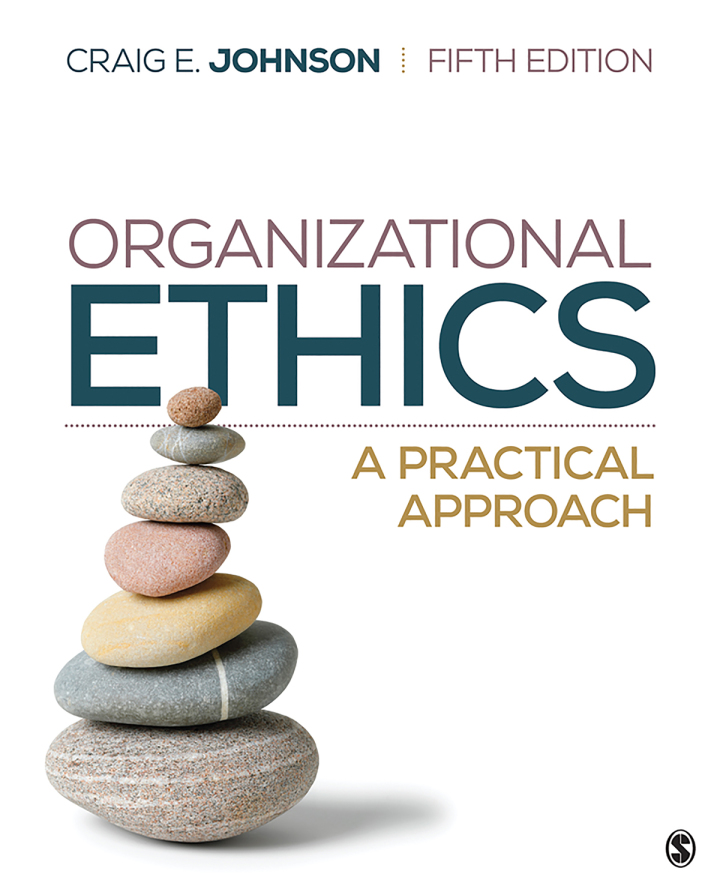
Organizational Ethics: A Practical Approach 5th Edition
PUBLISHER: Sage
Trường ĐH, Nhóm, Thư Viện: Gọi 0915920514 để báo giá eBook hosting trên Vital Source hoặc mua Sách In
Đạo đức tổ chức: Một cách tiếp cận thực tếVới trọng tâm liên ngành, Đạo đức tổ chức trang bị cho sinh viên kiến thức và kỹ năng cần thiết để tạo ra tác động tích cực ở nhiều nơi làm việc. Tác giả Craig E. Johnson xây dựng văn bản xoay quanh các cấp độ phụ thuộc lẫn nhau của hành vi tổ chức, xem xét đạo đức ở cấp độ cá nhân, nhóm và tổ chức. Việc tự đánh giá, các tính năng phản ánh và các dự án ứng dụng mang đến cho học sinh nhiều cơ hội để thực hành khả năng suy luận đạo đức của mình. Phiên bản thứ Năm bao gồm hơn 25 nghiên cứu điển hình mới về các sự kiện hiện tại và các nhân vật nổi bật, 24 bản tự đánh giá mới và các cuộc thảo luận mới về các chủ đề như xung đột đạo đức xuyên văn hóa và đạo đức tổ chức.
- List of Case Studies, Self-Assessments, Ethical Checkpoints, and Contemporary Issues in Organizational EthicsIntroduction: Making the Case for Studying Organizational EthicsAcknowledgmentsAbout the AuthorPart One Practicing Personal Ethics in the Organization
- Chapter 1 • Ethical Competencies and PerspectivesDeveloping Ethical CompetenciesDefining Organizational EthicsEthical PerspectivesUtilitarianism: Do the Greatest Good for the Greatest NumberKant’s Categorical Imperative: Do What’s Right Despite the ConsequencesRawls’s Justice as Fairness: Balancing Freedom and EqualityAristotelian Ethics: Live WellConfucianism: Building Healthy RelationshipsAltruism: Concern for OthersChapter TakeawaysApplication Projects
- Chapter 2 • Ethical Decision Making and ActionComponents of Ethical BehaviorComponent 1: Moral Sensitivity (Recognition)Component 2: Moral JudgmentComponent 3: Moral MotivationComponent 4: Moral CharacterDecision-Making FormatsAristotle’s Rules of DeliberationThe Lonergan/Baird MethodThe Moral CompassThe Foursquare ProtocolThe Five “I” FormatChapter TakeawaysApplication Projects
- Chapter 3 • Components of Personal Ethical DevelopmentComponent 1: Discovering VocationDiscovering Your CallingThe Dark Side of a CallingComponent 2: Identifying Personal ValuesComponent 3: Developing CharacterPositive Psychology and VirtuesDirect Approaches to Character DevelopmentIndirect Approaches to Character DevelopmentComponent 4: Creating a Moral IdentityComponent 5: Drawing Upon Spiritual ResourcesSpiritual DisciplinesSpiritual Well-BeingChapter TakeawaysApplication ProjectsPart TWO Practicing Interpersonal Ethics in the Organization
- Chapter 4 • Ethical Interpersonal CommunicationDialogue: An Ethical Framework for Interpersonal CommunicationEthical Communication CompetenciesImmediacy BehaviorsMindfulnessEffective ListeningSelf-DisclosureConfirmationEmotional IntelligenceTrust BuildingGiving and Receiving FeedbackChapter TakeawaysApplication Projects
- Chapter 5 • Exercising Ethical InfluenceQuestions of PowerQuestion 1: Are Some Forms of Power More Ethical Than Others?Question 2: Is It Possible to Have Too Much Power?Question 3: Should I Play Politics?Question 4: What Factors Contribute to Empowerment?Ethical Issues in InfluenceFramingProactive TacticsImpression ManagementDeceptionEmotional LaborCommunication of ExpectationsChapter TakeawaysApplication Projects
- Chapter 6 • Ethical Conflict ManagementConflict in Organizational LifeBecoming an Ethical Conflict ManagerStep 1: Recognize the Differences Between Functional and Dysfunctional ConflictsStep 2: Take ControlStep 3: Identify Your Personal Conflict StyleStep 4: Develop Conflict GuidelinesStep 5: Employ Collaborative Conflict Management TacticsStep 6: Be Prepared to ApologizeResolving Conflict Through Ethical NegotiationEthical Issues in NegotiationAdopt an Integrative Approach to NegotiationCombating Aggression and Sexual HarassmentTypes of AggressionResisting and Reducing AggressionPreventing Sexual HarassmentChapter TakeawaysApplication ProjectsPart Three • Practicing Leadership, Followership, and Group Ethics
- Chapter 7 • Leadership and Followership EthicsEthical LeadershipThe Ethical Challenges of LeadershipThe Shadow Side of LeadershipStepping Out of the Shadows: Normative Leadership TheoriesEthical FollowershipThe Ethical Challenges of FollowershipMeeting the Moral Demands of Followership: Principles and StrategiesEthical Self-LeadershipChapter TakeawaysApplication Projects
- Chapter 8 • Improving Group Ethical PerformanceActing as a Morally Responsible Team MemberAdopting a Cooperative OrientationDoing Your Fair Share (Not Loafing)Displaying Openness and SupportivenessBeing Willing to Stand AloneResponding to Ethical Danger SignsGroupthinkPolythinkMismanaged AgreementTeam Defense MechanismsEscalating CommitmentMoral ExclusionChapter TakeawaysApplication ProjectsPart Four • Practicing Ethics in Organizational Systems
- Chapter 9 • Building an Ethical OrganizationMaking Ethics MatterComponents of Ethical CultureFormal ElementsInformal ElementsCultural Change EffortsEthical DriversChapter TakeawaysApplication Projects
- Chapter 10 • Managing Ethical Hot Spots in the OrganizationEthical MarketingEthical Issues in MarketingEthical Principles and StrategiesEthical Finance and AccountingEthical Issues in Finance and AccountingEthical Principles and StrategiesEthical Human Resource ManagementEthical Issues in Human Resource ManagementEthical Principles and StrategiesChapter TakeawaysApplication Projects
- Chapter 11 • Promoting Sustainable Organizational CitizenshipThe Organization as CitizenComponents of Organizational CitizenshipStakeholder FocusSustainabilityCorporate Social ResponsibilityCorporate/CEO ActivismPromoting Organizational CitizenshipAdopt a Stewardship Mind-SetAct as a Citizenship Catalyst/Social IntrapreneurMeasure Social PerformanceChapter TakeawaysApplication Projects
- Chapter 12 • Ethics in a Global SocietyThe Dangers of Globalization and the Challenges of Ethical DiversityDeveloping Cross-Cultural Ethical CompetenceComing to Grips With Perceptual BiasesBecoming a World CitizenUnderstanding Ethical DiversityFinding Moral Common GroundResolving Cross-Cultural Ethical ConflictsChapter TakeawaysApplication ProjectsNotesReferencesIndexRead Less















